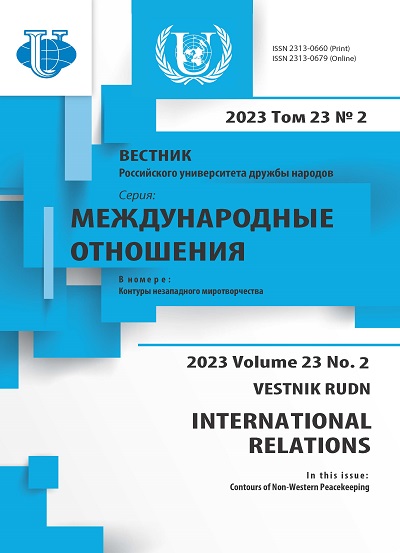Role of Russian Peacekeeping in the Pridnestrovian Settlement Process
- 作者: Shevchuk N.V.1
-
隶属关系:
- North-West Institute of Management of RANEPA
- 期: 卷 23, 编号 2 (2023): Contours of Non-Western Peacekeeping
- 页面: 228-240
- 栏目: THEMATIC DOSSIER
- URL: https://journals.rudn.ru/international-relations/article/view/35169
- DOI: https://doi.org/10.22363/2313-0660-2023-23-2-228-240
- EDN: https://elibrary.ru/JIQDRW
如何引用文章
详细
The study analyses the current situation of the peacekeeping operation in Pridnestrovie (Transnistria), carried out in conditions of a growing clash of interests between Russia and the West, the militarization of Moldova and its aspirations to join the EU and NATO, as well as the proximity of the security zone controlled by peacekeepers to the region of Russia’s special military operation in Ukraine. The author summarizes the experience of Russia’s peacekeeping activities in the region of the Moldovan-Pridnestrovian conflict, highlights the key features of the Dniester peacekeeping operation and shows its importance for the negotiation process on the Pridnestrovian settlement at the political and diplomatic level. The article provides an overview of the international peacekeeping initiatives in the conflict region, assesses the status of the negotiation process and the related military component of the settlement, identifies the specific features of the peacekeeping format and its control mechanisms, and analyzes the legal status of Russian troops. The author concludes that the peacekeeping operation in Pridnestrovie is still in demand, fully functional and ready for combat. According to the author, in case of withdrawal from the operation of the Republic of Moldova, the Russian military formations stationed in Pridnestrovie may be forced to receive the mandate of a special guarantee military operation to protect the stocks of Russian weapons remaining from Soviet times in the conflict region, to prevent the resumption of armed conflict and to ensure guarantees of peace and security for the population of Pridnestrovie, at least one third of which are citizens of the Russian Federation.
作者简介
Nina Shevchuk
North-West Institute of Management of RANEPA
编辑信件的主要联系方式.
Email: shevchuk-nv@ranepa.ru
ORCID iD: 0000-0001-6164-5767
PhD (Political Sciences), Leading Researcher, the Research Institute of Strategic Planning and Eurasian Integration; Associate Professor, Russian Presidential Academy of National Economy and Public Administration, North-Western Institute of Management
Saint-Petersburg, Russian Federation参考
- Bejan, A. M. (2017). The status of the peacekeeping operations in the Transnistrian conflict. Contemporary Readings in Law and Social Justice, 9(2), 236-244.
- Dergachev, A. Yu. (2018). Russian Federation and resolution of conflicts in the post-Soviet space (evolution of conceptual frameworks and peacekeeping practices). Gumanitarnye Problemy Voennogo Dela, (1), 23-28. (In Russian).
- Gubar, A. N. (2022). The role of Russia in the settlement of the acute phase of the Transnistrian conflict (1990-1992). Sovremennaya Nauchnaya Mysl’, (5), 202-207. (In Russian). https://doi.org/10.24412/2308-264X-2022-5-202-207
- Ignat’ev, V. V. (2015). Threat to peace on the Dniester: new challenges - old performers. Postsovetskiy Materik, (1), 65-72. (In Russian).
- Kosienkowski, M. (2019). The patron-client relationship between Russia and Transnistria. In T. Hoch & V. Kopeček (Eds.), De facto states in Eurasia (pp. 183-207). London: Routledge.
- Kowalski, S. V., & Movilanu, V. V. (2020). Polemics over the results of the Transnistrian conflict. Science Time, (1), 28-38. (In Russian).
- Kowalski, S. V., Antoch, A. M., & Skobioale, N. N. (2019). How the war ended: “Agreement on the principles for a peaceful settlement of the armed conflict in the Dniester region of the Republic of Moldova”. Science Time, (12), 42-51. (In Russian).
- Lutterjohann, N. (2023). The depth of the deadlock? Underlying themes in the Georgian-Abkhaz and Moldovan-Transnistrian post-Soviet conflicts. National Identities, 25(1), 53-74. https://doi.org/10.1080/14608944.2022.2050197
- Lynch, D. (2000). Russian peacekeeping strategies in the CIS: The cases of Moldova, Georgia and Tajikistan. London: Palgrave Macmillan. https://doi.org/10.1057/9780333984215
- Mayorov, M. V. (2007). Peacemakers. From the experience of Russian diplomacy in mediation. Moscow: Mezhdunarodnye otnosheniya publ. (In Russian).
- Myalo, K. G. (2002). Russia and the last wars of the twentieth century. Moscow: Veche publ. (In Russian).
- Nikitin, A. I. (2009). Conflicts, terrorism, peacemaking. Moscow: Navona publ. (In Russian).
- Potter, B. (2022). Unrecognized republic, recognizable consequences: Russian troops in “frozen” Transnistria. Journal of Advanced Military Studies, 13(Special Issue), 168-188. https://doi.org/10.21140/mcuj.2022SIstratcul010
- Rastoltsev, S. V. (2018). Three myths about ‘frozen conflicts’ in post-Soviet Europe: Critical analysis. International Relations, (4), 82-94. (In Russian). https://doi.org/10.7256/2454-0641.2018.4.28227
- Romanchuk, S. I. (2014). Russia’s peace-making at post-Soviet space. Results and prospects. World Economy and International Relations, (1), 72-79. (In Russian).
- Rotaru, V. (2022). Change or continuity in Russia’s strategy towards secessionist regions in the ‘near abroad’? The International Spectator, 57(4), 86-103. https://doi.org/10.1080/03932729.2022.2066821
- Shamarov, P. V. (2022). Conceptualizing Russia’s peacekeeping efforts as a necessity in the current complicated international situation. National Strategy Issues, (2), 14-34. (In Russian).
- Shevchuk, N. V. (2020). Peacekeeping on the Dniester: “Execution cannot be forgiven”. In O. Y. Mihalev & V. I. Sal’nikov (Eds.), Problems of the post-Soviet countries, Central and South-Eastern Europe: A collection of academic papers (Vol. 4, pp. 149-159). Voronezh: Izdatel’skij dom VGU publ. (In Russian).
- Shevchuk, N. V. (2022). ‘Small steps’ approach to conflict settlement: The case of Transnistria. Mezhdunarodnye Processy, 20(1), 38-54. (In Russian). https://doi.org/10.17994/IT.2022.20.1.68.1
- Troitskiy, E. F. (2016). EU policy towards the Transnistrian conflict (1992-2015). Siberian Historical Research, (3), 28-40. (In Russian). https://doi.org/10.17223/2312461X/13/2
- Velikaya, N. M., & Tatarov, R. A. (2021). Geopolitical cases in the process of settlement of the Transnistrian conflict. RSUH/RGGU Bulletin. Eurasian Studies. History. Political Science. International Relations Series, (3), 116-129. (In Russian). https://doi.org/10.28995/2686-7648-2021-3-116-129
- Yazkova, A. (2014). Republic of Moldova - Pridnestrovie - Russian Federation. Evropeyskaya Bezopasnost’: Sobytiya, Otsenki, Prognozy, (33), 8-11. (In Russian).
- Zadohyn, A. G. (2018). Transnistria and Moldova on the edge of Eurasia. Vestnik Diplomaticheskoy Akademii MID Rossii. Rossiya i Mir, (3), 33-42. (In Russian).








